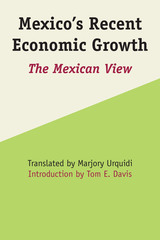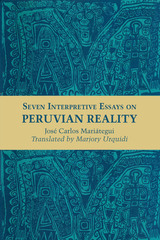
The Mexican economy underwent a process of growth and transformation in the twentieth century, which was confirmed by the indexes and figures that economists use to chart the rate of growth, even allowing for possible inaccuracies in these figures.
This volume of six essays makes readily available to English-speaking readers a selection of significant contributions by outstanding Mexican economists dealing with the mid-twentieth-century growth of the Mexican economy.
Enrique Pérez López provides an overview of the development of the gross national product in the economy and the structural changes that were imperative if basic social goals were to be implemented and the optimal adjustments to changing world conditions effected. Ernesto Fernández Hurtado discusses the process of accommodation and cooperation between the public and the private sectors that has contributed significantly to economic growth, stressing particularly the role of agriculture. Mario Ramón Beteta describes central bank policy and the functioning of the Central Bank, showing how control over credit and the banking system assures stability and accelerating growth through its credit rationing.
Alfredo Navarrete R. traces the sources of domestic savings that have provided 90 percent of the capital employed in the economy since the Revolution, and Ifigenia M. de Navarrete demonstrates that rapid economic growth has not resulted in a more equitable distribution of income. Victor Urquidi stresses the balanced growth, achieved by allocating public capital formation to basic infrastructure, that has helped develop agriculture as well as industry, and indicates the nature of the structural change that must occur if the economy is to expand rapidly.
In his introduction Tom E. Davis compares growth in Mexico with developments during the same period in Chile and Argentina.
The country reached its midcentury standard of living after fifty years of drastic social and political changes under a constitution that altered the system and the concept of private property and the role of the state. These new concepts brought about changes in the structure of production and social relationships, together with a rise to new cultural, technical, and moral levels. These changes, in turn, placed Mexico in a new position with new problems. A question that must be answered is whether the economic goals of the future require a reappraisal of social relationships and of the ways of administering and utilizing the country’s resources and potential productivity.

"Once again I repeat that I am not an impartial; objective critic. My judgments are nourished by my ideals, my sentiments, my passions. I have an avowed and resolute ambition: to assist in the creation of Peruvian socialism. I am far removed from the academic techniques of the university."—From the Author's Note
Jose Carlos Mariátegui was one of the leading South American social philosophers of the early twentieth century. He identified the future of Peru with the welfare of the Indian at a time when similar ideas were beginning to develop in Middle America and the Andean region. Generations of Peruvian and other Latin American social thinkers have been profoundly influenced by his writings.
Seven Interpretive Essays on Peruvian Reality (Siete ensayos de interpretación de la realidad peruana), first published in 1928, is Mariátegui's major statement of his position and has gone into many editions, not only in Peru but also in other Latin American countries. The topics discussed in the essays—economic evolution, the problem of the Indian, the land problem, public education, the religious factor, regionalism and centralism, and the literary process—are in many respects as relevant today as when the book was written.
Mariátegui's thinking was strongly tinged with Marxism. Because contemporary sociology, anthropology, and economics have been influenced by Marxism much more in Latin America than in North America, it is important that North Americans become more aware of Mariátegui's position and accord it its proper historical significance.
Jorge Basadre, the distinguished Peruvian historian, in an introduction written especially for this translation, provides an account of Mariátegui's life and describes the political and intellectual climate in which these essays were written.
READERS
Browse our collection.
PUBLISHERS
See BiblioVault's publisher services.
STUDENT SERVICES
Files for college accessibility offices.
UChicago Accessibility Resources
home | accessibility | search | about | contact us
BiblioVault ® 2001 - 2024
The University of Chicago Press









